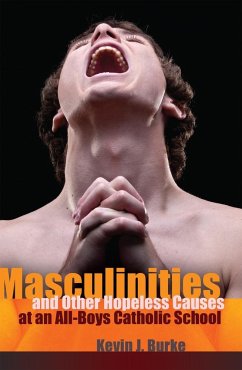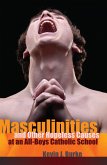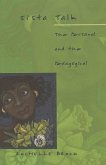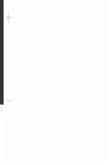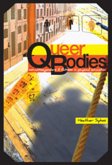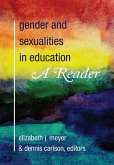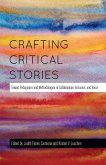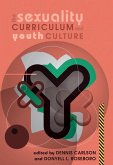We get our fixed - or malleable - notions of sexuality and gender from a variety of sources: family expectations, a hypersexualizing media gaze, and through the dictates of those great monoliths, Faith and Obedience within a/the Church. However, gender is also being formed in the well-worn halls and the ordered environment of classrooms: schools are the great throughways where gender gets most articulated - bartered for and with - during adolescence.
This book documents a year-long autoethnographic study in an all-boys Catholic secondary school. It elucidates how schooling helps form both assumptions and practices about what it means to become a man, and examines how these discourses are reshaped by young men in their daily lives. In the process the book explicates how students come to make sense of and exercise their own identities amidst the discourses of the school around, through, and by religion and gender and, necessarily, sexuality.
This book documents a year-long autoethnographic study in an all-boys Catholic secondary school. It elucidates how schooling helps form both assumptions and practices about what it means to become a man, and examines how these discourses are reshaped by young men in their daily lives. In the process the book explicates how students come to make sense of and exercise their own identities amidst the discourses of the school around, through, and by religion and gender and, necessarily, sexuality.
«Much contemporary scholarship has explored the complex processes by which 'masculinity' is constructed and enacted by young men coming to adulthood in this society where what it means to be male and female is contested in new and sometimes confusing ways. Kevin J. Burke has entered that conversation armed both with post-modern 'tools to think with' and with a gift for sharp, empathic, and meticulous observation of this process at a site hitherto under-explored: an all-male Catholic high school in Chicago, where for an entire semester he immersed himself. His observations and insights are by turns revealing, disturbing, laugh-out-loud funny, and deeply moving - particularly as the researcher allows himself to be probed by his research project to come to terms with his own spiritual experience as a late adolescent growing up in a similar community and attending a rival Catholic school. The book provides a rare window into this raucous, raunchy, alternately violent and genuinely respectful all-male educational environment, where the dominant religious culture plays an intricate, sometimes paradoxical role in the boys' struggles to work out what it means to be men.» (John McDargh, Associate Professor, Department of Theology, Boston College)

